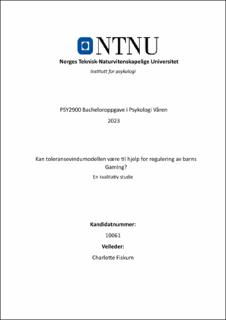| dc.contributor.advisor | Fiskum, Charlotte | |
| dc.contributor.author | Overby, Britt | |
| dc.date.accessioned | 2023-07-04T17:19:44Z | |
| dc.date.available | 2023-07-04T17:19:44Z | |
| dc.date.issued | 2023 | |
| dc.identifier | no.ntnu:inspera:146342237:36585450 | |
| dc.identifier.uri | https://hdl.handle.net/11250/3075774 | |
| dc.description.abstract | Sammendrag
Dataspill er blitt en naturlig del av barn og unges hverdag. Mange foreldre er bekymret over barnas dataspilling, og er usikre på hvordan de best kan regulere dataspillaktiviteten til sine barn. Dataspill kan være en arena for både læring, underholdning og sosialt samvær. For enkelte kan allikevel spillingen ha negative konsekvenser.
Dette er en kvalitativ studie som ser på hvilke tanker og betraktninger fagpersoner som jobber med problemstillingen som foreldre til barn og ungdom som gamer møter, og hvilke tanker de har om hvordan foreldre kan håndtere konflikter som oppstår i forbindelse med deres ønsker om å regulere barn som gamer. Studien vil også se på informantenes tanker om toleransevindumodellen kan være til hjelp som ett verktøy for å identifisere affektnivå hos foreldre, til bruk for regulering av barns gaming når det er behov for det.
Som metode er semantisk tematisk analyse brukt til innsamling og tolkning av data, da hovedfokus har vært det som eksplisitt har blitt fortalt. Data er transkribert fra 5 som ble intervjuet, og hentet fra 6 nettskjema innsendt av utvalgte informanter.
Ett av de viktigste funnene fra denne studien er informantenes opplevelse av manglende interesse fra foreldre av gaming som aktivitet, og utfordringene dette medfører når man samtidig ønsker å regulere aktiviteten. Det andre er bevisstgjøring av foreldre i forhold til gaming og hvordan møte barna som spiller på best måte. | |
| dc.description.abstract | Summary
Gaming have become a natural part of children's and young people's everyday lives. Many parents are concerned about their children's computer gaming and are unsure of how to best regulate their children's computer gaming activity. Computer games can be an arena for both learning, entertainment, and socializing. For some, however, gaming can have some negative consequences.
This is a qualitative study that looks at what thoughts and considerations professionals who work with the problem that parents of children and young people who are gamers face, and what thoughts they have about how parents can handle conflicts that arise when they want to regulate children who play computer games. The study will also look at the informants' thoughts on whether the tolerance window model can be of help as a tool for identifying the level of affect in parents, for use in regulating children's gaming when there is a need for it.
As a method, semantic thematic analysis is used for the collection and interpretation of data, as the main focus has been what has been explicitly told. Data has been transcribed from 5 who were interviewed, and taken from 6 online forms submitted by selected informants.
One of the most important findings from this study is the informants' experience of a lack of interest from parents in gaming as an activity, and the challenges this entails when you also want to regulate this activity. The second is raising awareness of parents in relation to gaming and how to meet the children who play in the best way. | |
| dc.language | nob | |
| dc.publisher | NTNU | |
| dc.title | Kan toleransevindumodellen være til hjelp for regulering av barns Gaming? | |
| dc.type | Bachelor thesis | |
